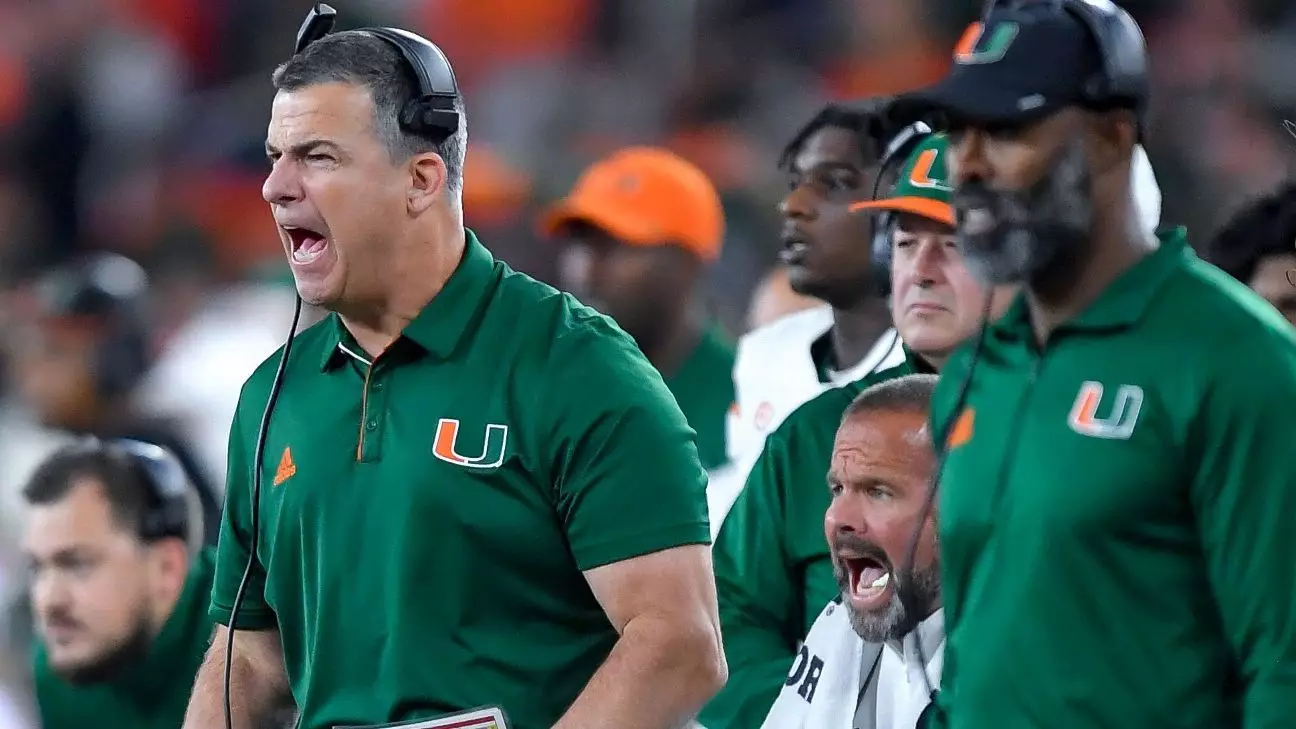The recent College Football Playoff (CFP) rankings announcement has stirred debate and disappointment, particularly within the Miami Hurricanes’ camp and the Atlantic Coast Conference (ACC). As the season reaches its climax, the implications of the rankings have raised critical questions about fairness, performance criteria, and the future of college football playoffs.
On Tuesday, as the College Football Playoff rankings were unveiled, the Miami Hurricanes found themselves in a challenging position. They slipped from a more favorable ranking to No. 12, creating an uproar among fans and officials alike. The ACC Commissioner, Jim Phillips, expressed an emphatic disappointment regarding this decline, claiming that the Hurricanes “absolutely deserve better from the committee.” This sentiment resonates profoundly with Miami supporters who have been following the team’s unwavering journey through the season.
Miami, under head coach Mario Cristobal, began the season powerfully, winning their first nine games. However, slipping to a record of 10-2 following a second loss to Syracuse in conference play hurt their standing. Their failure to qualify for the ACC title game, a pivotal contest for playoff aspirations, compounded dismay. The negative trajectory at the season’s close has raised eyebrows and sparked heated discussions over the fairness of playoff selection criteria.
In the face of adversity, Mario Cristobal vocally defended his team on a local radio station, requesting that the selection committee focus on tangible evidence. Throughout the interview, he highlighted the squad’s accomplishments, including a standout season marked by victories against formidable opponents like Florida and a record of playing closely contested games—most losses within a single possession. Cristobal emphasized that only a few college teams achieved ten wins, suggesting his Hurricanes should be recognized for this significant accomplishment.
Yet, while Cristobal bolstered his case by pointing to the team’s offensive stats, the committee seemed unperturbed by such points. He also pointed out that Miami’s statistics in yards per game and points scored alternately showcase their powerful offensive capabilities, as quarterback Cam Ward’s exceptional season—leading the nation in touchdown passes—might merit further recognition. However, these compelling individual accomplishments have not translated into a supportive collective narrative that swayed the committee’s decision.
Despite the impressive statistics presented by Miami, doubts about their overall performance arose as they faced criticism for their scheduling. Due to a lack of matchups against ranked opponents during their run, many analysts and critics diminished their previous success. Additionally, defensive vulnerabilities—where the Hurricanes allowed an alarming number of points in crucial games—became focal points for detractors. The notion that outdated performance metrics played a significant role in the committee’s decisions cannot be overlooked.
This divergence between perception and actual performance illustrates the complexity of college football rankings. While Miami’s offense dazzled, the defensive struggles and scheduling dilemmas cast shadows on their campaign. Such contrasts pose essential considerations about what truly defines a deserving playoff contender. Are playoffs reserved only for teams showing stellar records against ranked opponents, or should a more holistic view of a team’s talent and resilience be taken into account?
The situation of the Miami Hurricanes unveils broader issues within college football’s playoff structure. As teams like Alabama, who have lost several games yet maintained a higher ranking, toy with the playoff selection, questions arise about the inherent biases in the evaluation process. This presents an ongoing challenge to the integrity and transparency of college football’s most prestigious tournaments.
The Miami Hurricanes’ experience following the recent CFP rankings offers a microcosmic glimpse into the frustrations, complexities, and evolving nature of college football. As they navigate disappointment, the dialogue regarding fairness in playoff selections continues to be essential. In an ever-changing landscape of college sports, the need for a robust and equitable evaluation system remains imperative, ensuring that deserving teams receive recognition based on merit and performance rather than narrative alone.


Leave a Reply